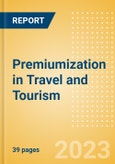This thematic research report takes an in-depth look at the theme of Premiumization and the impact it has on the travel and tourism industry. This report analyzes the players impacted by this theme alongside the contributing trends, unintended opportunities, and trends that have emerged as a result of Premiumization. It then dives deep into an industry analysis, presenting several real-life case studies looking at how destinations and companies have responded to the impact of this theme on their operations.
Key Highlights
The theme of premiumization, and the upscale and luxury markets, now have the opportunity to thrive in an industry that has had to rapidly change to meet new changes in traveler demands. The increased need for privacy, a greater focus on health and wellbeing, a desire to tick off ‘bucket list' experiences, unintentional saving of money, tendency to take longer trips, the focus on eco-tourism, and increase in millionaires means the theme of premiumization will continue to grow in importance.Tourism companies operating in the premiumization theme share common features. They offer either unique, differentiated, or exclusive products and services. The theme of premiumization does not necessarily mean that all sectors involved only cater to high-yielding tourists. Tourism sectors associated with this theme offer premium experiences for travelers from a range of socioeconomic backgrounds. This is because of their nature, they either have to, or it makes sense financially. For example, the destination, gastronomy, airport, retail, and attraction sectors allow travelers on a range of different budgets to experience their offerings. However, the level of disposable income available to each traveler will shape what kind of experience and level of personalization they have in these sectors.
Personalization is key in premium offerings, the shift from focusing solely on premium products to emphasis on delivering exclusive and personalized offerings is apparent. Younger generations, like Gen Y that are more active on social media, may seek to capture picture-worthy moments for their online presence. On the other hand, ultra-high net worth individuals may seek truly unique and exclusive experiences. Therefore, smart destinations can help to create hyper-personalized services and products.
Who should buy?
CEOs, Senior Executives, and Marketing Executives within travel and tourism should use this report to understand the highly important theme of Premiumization.
Scope
- This thematic report provides an overview of the impact Premiumization has on the travel sector and seeks to understand some of the contributory factors
- The key trends within this theme are split into three categories: consumer trends, enterprise trends, and industry trends
- Several case studies are included to analyze the multiple ways countries and companies have responded to the impact of this theme's growth and what they are doing to grow with this theme
Reasons to Buy
- Understand the Premiumization trends within the travel landscape today and how these will escalate in the near future
- Assess how travel and tourism companies such as tour operators, OTAs and DMOs are utilizing Premiumization to drive revenues
- Acknowledge the potential pitfalls of using Premiumization by understanding the social, cultural, and environmental effects on the destination
- Discover recommendations for businesses involved in Premiumization
- The publisher's thematic research ecosystem is a single, integrated global research platform that provides an easy-to-use framework for tracking all themes across all companies in all sectors. It has a proven track record of identifying the important themes early, enabling companies to make the right investments ahead of the competition, and secure that all-important competitive advantage
- All across the travel and tourism supply chain, now have an opportunity to capitalize on Premiumization, and there are notable examples of this. Therefore, all should buy this report to fully understand how this theme will continue to be a key theme in the future travel landscape.
Table of Contents
- Executive Summary
- Players
- Thematic Briefing
- Trends
- Technology trends
- Macroeconomic trends
- Regulatory trends
- Industry Analysis
- Distribution of wealth
- Luxury hotels
- Lodging
- Case studies
- Timeline
- Signals
- Company filing trends
- Social media trends
- Value Chain
- Primary supplier
- Secondary suppliers
- Third-party suppliers
- Companies
- Public companies
- Private companies
- Sector Scorecards
- Lodging sector scorecard
- Glossary
- Further Reading
- Our Thematic Research Methodology
- About the Publisher
- Contact the Publisher
Companies Mentioned (Partial List)
A selection of companies mentioned in this report includes, but is not limited to:
- Marriott International
- One & Only
- Four Seasons
- Qatar Airways
- Abercrombie & Kent
- Carnival Cruise Line
- British Airways
- Habitas
- Melco Resorts & Entertainment
- Singapore Changi Airport
- IYC
- Dubai Mall
- Harvey Nichols
- Zurich Airport
- LunaJets
- Red Savannah
- Scott Dunn
- Black Tomato
- Audley Travel
- Turquoise Holidays
- Viking Cruises
- Kempinski
- Hong Kong International Airport
- Carnival Corporation
- Deutsche Lufthansa
- LVMH
- Royal Caribbean Cruises.








